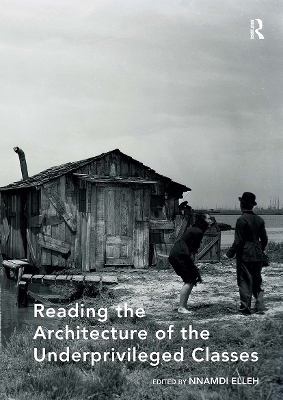
Reading the Architecture of the Underprivileged Classes
Routledge (Verlag)
978-1-032-83752-9 (ISBN)
The expansion of cities in the late C19th and middle part of the C20th in the developing and the emerging economies of the world has one major urban corollary: it caused the proliferation of unplanned parts of the cities that are identified by a plethora of terminologies such as bidonville, favela, ghetto, informal settlements, and shantytown. Often, the dwellings in such settlements are described as shacks, architecture of necessity, and architecture of everyday experience in the modern and the contemporary metropolis. This volume argues that the types of structures and settlements built by people who do not have access to architectural services in many cities in the developing parts of the world evolved simultaneously with the types of buildings that are celebrated in architecture textbooks as 'modernism.' It not only shows how architects can learn from traditional or vernacular dwellings in order to create habitations for the people of low-income groups in public housing scenarios, but also demonstrates how the architecture of the economically underprivileged classes goes beyond culturally-inspired tectonic interpretations of vernacular traditions by architects for high profile clients. Moreover, the essays explore how the resourceful dwellings of the underprivileged inhabitants of the great cities in developing parts of the world pioneered certain concepts of modernism and contemporary design practices such as sustainable and de-constructivist design. Using projects from Africa, Asia, South and Central America, as well as Austria and the USA, this volume interrogates and brings to the attention of academics, students, and practitioners of architecture, the deliberate disqualification of the modern architecture produced by the urban poor in different parts of the world.
Nnamdi Elleh is Associate Professor of architecture history and theory, and the Director of the Master of Science in Architecture Program at the University of Cincinnati, Ohio.
Introduction; I: Context(s) and Theoretical Underpinnings; 1: Reading the Architecture of the Underprivileged Classes; 2: The Global Context(s): Architecture and Urban Revolution(s) to Transform the Society and the Individual, 1900-2014; 3: Architecture of the Underprivileged Classes and Cubism; II: Sustainable Shared Spaces and Experiences of Modernity; 4: House of Blues: The Shotgun and Scarcity Culture in the Mississippi Delta; 5: Cultural facilities in the Opaque Spaces of Brazilian Cities as Instruments of Resistance; 6: Grass Roots Modernism: Architecture and Organization in Austrian Settlements and Allotment Gardens, 1921-1925; 7: A Tiny Whole World: Sustainable Design Lessons from the Architecture of Underprivileged Classes; 8: The Politics of Nation in the Urban Form of Informal Settlements in Quezon City, Philippines; III: Politics and Urban Regulations: Demolished and Refurbished Neighborhoods; 9: Spatial Misreading: South Africa's Urban Future Seen from Within a Township Shack; 10: Preparations for the Sports Mega-Events in Brazil and the Popular Protests of 2013; 11: On Changes in the Dwelling Conditions of the Romanian Roma under Communism; 12: The Political Economy of Low and Moderate Income Urban Residential Development: A Case Study of Port Harcourt, Nigeria; 13: Invisible Visibility: The Abuja Housing Deficit as a Political Mirage; III: Conclusion
| Erscheint lt. Verlag | 24.6.2024 |
|---|---|
| Verlagsort | London |
| Sprache | englisch |
| Maße | 174 x 246 mm |
| Themenwelt | Naturwissenschaften ► Biologie ► Ökologie / Naturschutz |
| Naturwissenschaften ► Geowissenschaften ► Geografie / Kartografie | |
| Technik ► Architektur | |
| Technik ► Umwelttechnik / Biotechnologie | |
| ISBN-10 | 1-032-83752-7 / 1032837527 |
| ISBN-13 | 978-1-032-83752-9 / 9781032837529 |
| Zustand | Neuware |
| Haben Sie eine Frage zum Produkt? |
aus dem Bereich


